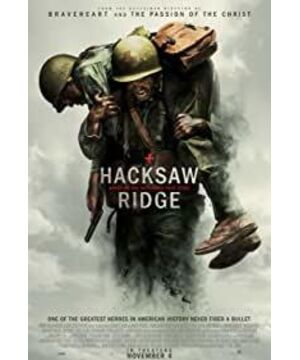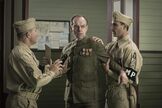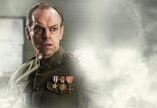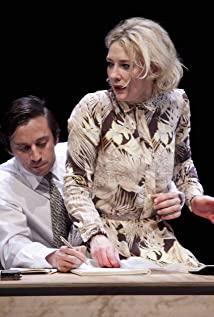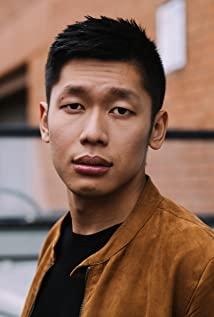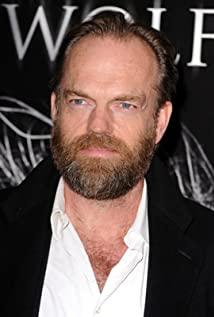After reading it, I have been very sorry. Why is it that a good story is not strong enough? After thinking about it for a day, I probably understood: Maybe this movie did not intend to achieve the same humanistic level as "Saving Private Ryan", or even the level of "Brave Heart". One or two can be inferred from the name of the movie. The above two films, plus "War Horse" and "Patriot", none of them directly embody the war, and this movie is simply named after the position or the battle. Perhaps, it wanted to refer to "Iwo Jima Family Letter", but from the movie's name, "Family Letter" suddenly gave the Battle of Iwo Jima a heavy humanistic support. It was not just a tragic battle---every soldier. It is not a simple killing machine, a letter from the family letter allows the soldiers to return to ordinary people with flesh and blood. "Hacksaw Ridge" is not only named after Doss, but also does not even have a "family letter". The Chinese translation is more straightforward "Blood War Hacksaw Ridge" --- this in itself emphasizes or highlights the essence of this movie, which is to depict the battlefield. When it is tragic, it directly throws away the possibility of humanistic depth. And watching the audience's words in the short commentary of the film---"hot blood", "burning", etc.? Prove this.
However, if you only highlight the cruelty of the battlefield, how different is it from games and plasma tablets? So the story of Doss is indispensable, this is the only humanistic foundation of the whole film. So the movie spent an hour describing his life before joining the army, and half of it described how he chased his wife. This is obvious, as long as you have received elementary school language training, you can see it: the beauty of the first half contrasts with the tragic of the second half. But the movie stopped here.
This would have been a good story. Even if starting from religion, this story can shock the soul more than "The Amish"; starting from the war, it can also trigger deeper thinking than "Saving Private Ryan"; starting from the plot or biography, it can also be more profound than "Forrest Gump" by fictional characters is more powerful. It is a pity that the focus of this movie is misplaced, which determines that it can only be regarded as a good one among many war movies.
The reason why "Saving Private Ryan" can trigger thinking is not because of the tragic beginning of nearly half an hour, but because of the views and experiences of everyone in the team; and these are firmly concentrated in the death of Captain Miller's death. "Earn this...". "War Horse" can earn enough tears, not because it portrays the dark clouds of the First World War battlefield, or the contrast with the picturesque pastoral life, but these have paved the way for the protagonist boy and the horse to meet each other after their various experiences. "Where you been..." Feeling burst out.
If you focus on the Doss battlefield rescue story and achieve the tension and thinking brought by the story of the true protagonist himself, then there are some places in this movie that can be cut off: for example, the suicide of the Japanese officer at the end of the battlefield, and how Doss chased his wife. Then the free time should be used to tell how the concept of Doss was formed. The decision of Doss in the movie is too abrupt and too thin. Based on the current script, it is estimated that even Tom Hanks will be powerless to act, let alone a niche? A smirk always makes people think that Doss may be a "two pole". But even if you are really a "two pole" like Forrest Gump, you need to explain clearly, let alone Doss is not a brainless man? So whether Doss's belief comes from belief or character, it should be explained. From the perspective of the movie, the development of Doss belief is two stages: first, when he was a child, he almost killed his brother in a fight. The influence of the belief in "don't kill" was highlighted. When he grew up, he almost shot his father to death in a parental conflict. It further promoted the specialization of the belief in "don't kill" into resolutely not to touch the gun. Regardless of whether these two stories are the best examples of the formation of their beliefs, the current arrangement of the film has not achieved the effect-it should not be told in sections, but should be done in one go, so that Doss will be Resolutely not holding a gun during the training of recruits, or even being forced away by both hard and soft, seems reasonable, and only then can the first climax of the film reach its due strength. Unfortunately, due to the film's strategy of disassembling and explaining the formation of the Doss concept, the first climax of recruit training must be increased by adding fictitious materials for delayed weddings and fathers seeking relationships to intercede in court to show a conflict effect. After disassembling, talking about almost shooting the father to dilute the foundation of this first climax, the latter's addition of a fictional plot eliminates the value of Doss's philosophy.
Another point of structural error is the imbalance between the depiction of the battlefield and the rescue of Doss. The latter should be the focus, while the former is the stage. The battlefield is overwhelmingly overwhelming, causing the shock that Doss has not yet achieved the rescue, so that many viewers have the first impression that this is impossible, like "hanging up". In fact, no matter how the script is written, since this thing happened in reality, we can realize the difficulty of Doss when we think about it seriously: not to mention that it is a miracle to survive the battlefield under the rain of bullets, a "corn stalk" that has been vegetarian. How can we save 70 or 80 comrades who are stronger than him overnight? It's too exhausting to be exhausted. This must be achieved by faith; there is no suitable pavement for this. Just a few shots of "one more" prayers are really exhausting.
Another point of conflict is how struggles Doss’s belief in not holding a gun has gone through in your life-and-death battle? This film only expresses a nightmare and the death of a big man who almost suddenly became a friend, which is too superficial.
Alas, all in all, from the overall layout structure to the detailed application, the required elements are displayed without failing "chemical reaction", there is contrast but no effect, and there is order but lack of logic.
View more about Hacksaw Ridge reviews


